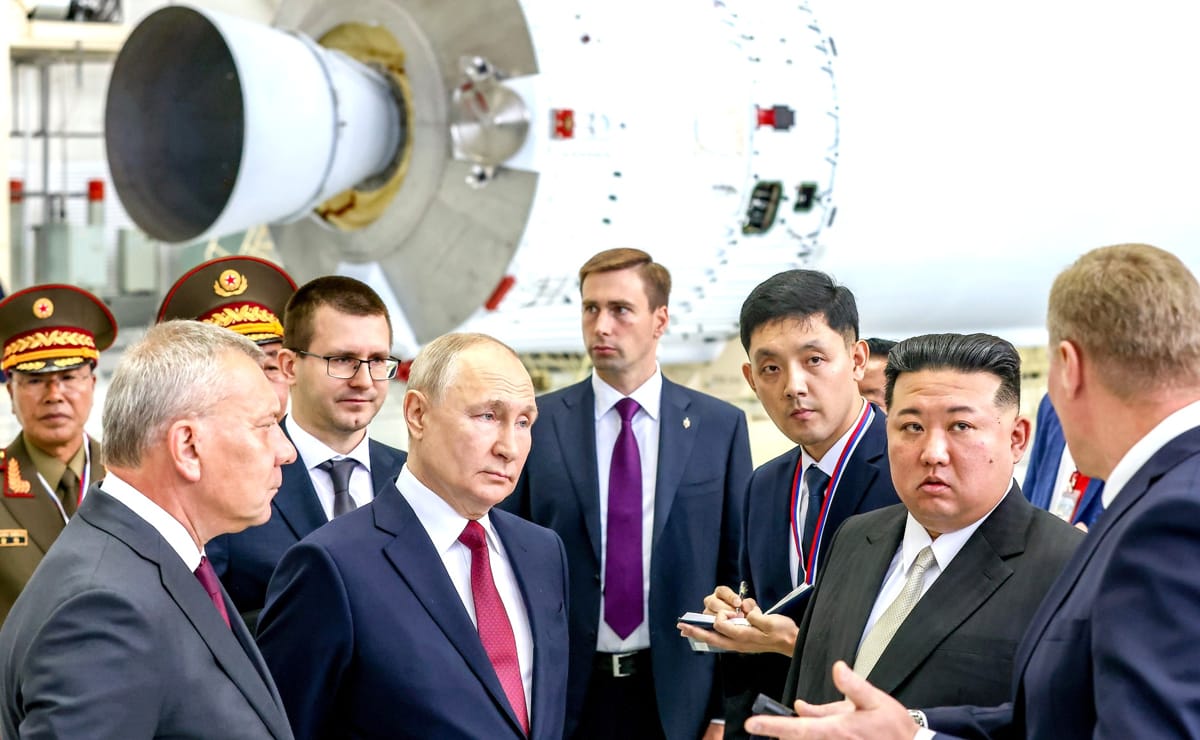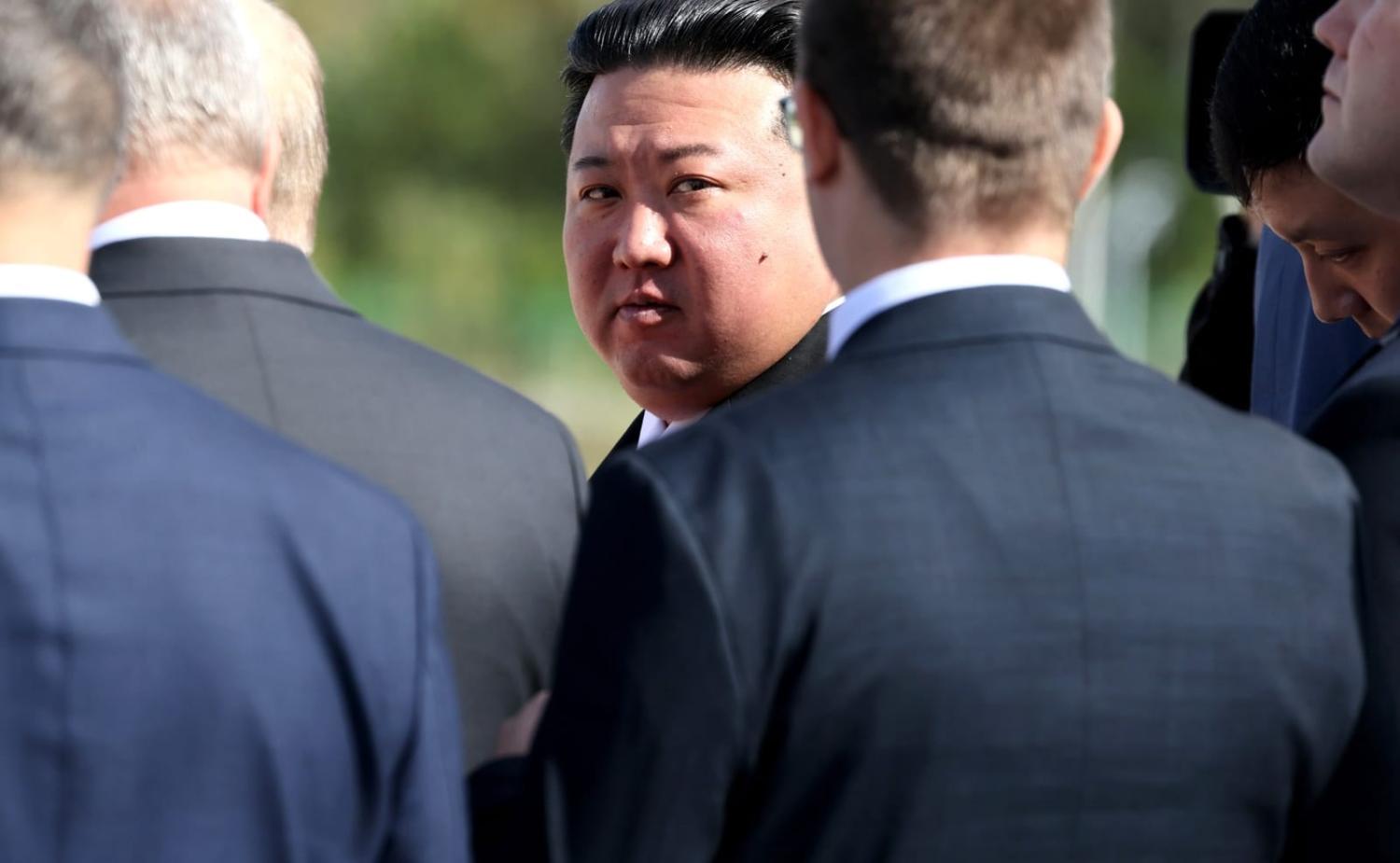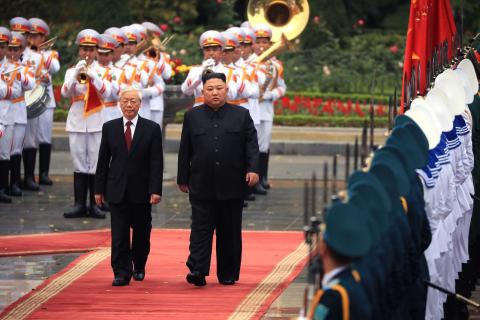North Korea’s Kim Jong-un and Russia’s Vladimir Putin pledged to stand together against “imperialism” after meeting on Wednesday, their first face-to-face summit in four years. North Korean media also announced on Thursday that Kim had invited Putin to visit Russia “at a convenient time” and that the Russian president accepted the invitation “with pleasure”.
The Wednesday meeting between Kim and Putin has implications not just for Moscow and Pyongyang, but also the Washington-led trilateral deterrence efforts involving Seoul and Tokyo.
While the United States has accused North Korea of supplying arms to Russia for its war in Ukraine, the Kim-Putin summit further exacerbated Washington’s fears about what might flow in the other direction. US National Security Council strategic communications coordinator John Kirby said on Wednesday that “any arrangement that would improve North Korea’s military capabilities certainly would be of significant concern to us,” adding that Washington “will deal with it appropriately” if an arms deal is indeed struck between Moscow and Pyongyang.
The vaguely worded warning, however, is unlikely to prevent Russia and North Korea from forging ahead with their plans. On the contrary, Putin’s decision to hold such a public summit meeting with Kim, despite the accusations of arms dealing, shows how determined the Russian leader is to make much-needed military gains in Ukraine – whatever it takes is his attitude.
Kim also does not appear concerned by threats of additional sanctions. Instead, the North Korean leader called bilateral relations with Russia “the very first priority for our country” adding that “we will always support the decisions of President Putin and the Russian leadership”. In addition, according to a recent report by Daily NK, multiple sources in North Korea have revealed that weapons exports have, in fact, increased recently to countries including Russia, Iran, Syria, Egypt and Qatar. In other words, North Korea has not only survived sanctions but continued to grow its arsenal while finding novel ways to keep proliferation going.
In return for selling Russia artillery shells and other munitions, North Korea is likely to want advanced military technological assistance as well as humanitarian aid. After hosting a Russian delegation back in July, Kim’s efforts seem to have paid off as Putin pledged on Wednesday to help North Korea build satellites and develop its space program. The meeting between the two leaders took place at Russia’s Vostochny Spaceport in Amur Oblast. Kim was afforded a tour of the space station, including of the carrier rocket assembly and test complex, and was briefed on the detailed technical features of various types of carrier rockets and their assembly and launching processes, North Korean media reported.
Plans to launch joint projects in the fields of tourism, construction, and agriculture were reportedly also discussed. Overall, the visit to Russia can be presented a major win for Kim.

But Wednesday was about more than Kim just showing off his diplomatic skills. This day also marked the first time that the North had launched missile tests without its leader in the country, demonstrating the country’s ability to coordinate weapon launches irrespective of Kim’s physical presence at home. The message appeared to be that even if Kim were to “disappear” (the South Korean government has spoken of potential pre-emptive strikes to remove the North Korean leadership), this does not mean that North Korea would be unable to attack the United States, South Korea, or Japan.
In response to the Kim-Putin summit, South Korea’s Prime Minister Han Duck-soo said on Wednesday that “news about the possibility of military cooperation between the two countries is worrisome,” while the ruling party leader Kim Gi-hyeon called the summit “a serious challenge threatening not only peace in Northeast Asia but also world peace”. The South Korean opposition is likely to use the Kim-Putin meeting to further criticise the government’s hardline North Korea approach.
Meanwhile, North Korean newspapers featured Kim’s visit to Russia across front-pages, celebrating the summit as a major victory for Kim. If Putin does indeed make the visit to North Korea any time soon, this would serve as yet another major boost for Kim’s image internationally. Kim is showing the world that he is far from isolated and is instead negotiating on an equal footing with a major power. Given the situation in Ukraine and Russia’s urgent need for weapons, it’s not far-fetched to say that, as of now, Putin needs Kim more than the other way around.
While the strengthening ties between Moscow and Pyongyang pose a significant challenge to Washington and its allies, the possibility of North Korea joining Russia and China in joint military drills could finally spell an end for US-led deterrence efforts. South Korea’s intelligence service said the Russian side had officially proposed trilateral military drills to North Korea while visiting the country in July.
The South’s defence ministry said on Thursday that it would continue closely monitoring the possibility of North Korea and Russia conducting joint military drills. With the United States, South Korea, and Japan consistently holding joint exercises, there is little ground to criticise a move in kind by Pyongyang.
Here, again, North Korea holds the leverage, not the United States. Washington is currently making demands and threats but should instead tone down its rhetoric and reprioritise diplomacy before North Korea makes more choices that worsen regional stability and further raise military tensions on the peninsula.

